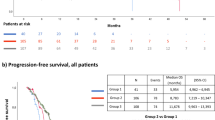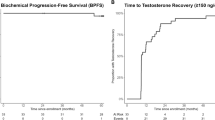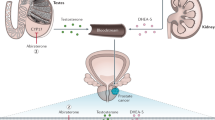Abstract
Background:
Androgen receptor signaling remains important in castration-resistant prostate cancer (CRPC) as demonstrated by the efficacy of abiraterone acetate (henceforth abiraterone) in phase III trials. Given that heterogeneous patient responses are observed, we sought to identify clinical factors associated with duration of abiraterone.
Methods:
We retrospectively identified patients with CRPC treated with abiraterone in our database. Patient characteristics and types and duration of prostate cancer (PC) therapies were analyzed. These parameters were analyzed with duration of abiraterone in univariate and multivariable analyses.
Results:
We identified 161 patients who had received abiraterone. All had received primary androgen-deprivation therapy (ADT), 86% prior secondary hormone therapy (SHT) and 33% prior chemotherapy. The median duration of primary ADT was 23 months, duration of SHT (excluding abiraterone) was 17 months and duration of chemotherapy was 8 months. We demonstrated that lower PSA at abiraterone initiation, longer primary ADT duration, no prior ketoconazole, no prior chemotherapy and longer chemotherapy duration were associated with a longer duration on abiraterone in univariate analysis. In multivariable analysis, duration of primary ADT (duration of abiraterone 9 versus 13 months for ⩽12 versus >12 months, P=0.03) and no use of prior chemotherapy (duration of abiraterone 16 versus 7 months for no versus yes prior chemotherapy, P<0.01) were associated with duration of abiraterone.
Conclusions:
Several clinical parameters, including type and duration of prior therapy, are predictive of responsiveness to abiraterone. These parameters are logical and correlate with smaller disease burden or less exposure to PC therapies. This information can help physicians counsel patients about the potential durability of efficacy of abiraterone. Identifying predictive biomarkers that inform patient selection for therapy is critical to optimizing treatment outcomes.
This is a preview of subscription content, access via your institution
Access options
Subscribe to this journal
Receive 4 print issues and online access
$259.00 per year
only $64.75 per issue
Buy this article
- Purchase on Springer Link
- Instant access to full article PDF
Prices may be subject to local taxes which are calculated during checkout

Similar content being viewed by others
References
Huggins C, Hodges CV . Studies on prostatic cancer. I. The effect of castration, of estrogen and androgen injection on serum phosphatases in metastatic carcinoma of the prostate. CA Cancer J Clin 1972; 22: 232–240.
James ND, Sydes MR, Clarke NW, Mason MD, Dearnaley DP, Spears MR et al. Addition of docetaxel, zoledronic acid, or both to first-line long-term hormone therapy in prostate cancer (STAMPEDE): survival results from an adaptive, multiarm, multistage, platform randomised controlled trial. Lancet 2015; 387: 1163–1177.
Sweeney CJ, Chen YH, Carducci M, Liu G, Jarrard DF, Eisenberger M et al. Chemohormonal therapy in metastatic hormone-sensitive prostate cancer. N Engl J Med 2015; 373: 737–746.
Beer TM, Armstrong AJ, Rathkopf DE, Loriot Y, Sternberg CN, Higano CS et al. Enzalutamide in metastatic prostate cancer before chemotherapy. N Engl J Med 2014; 371: 424–433.
de Bono JS, Logothetis CJ, Molina A, Fizazi K, North S, Chu L et al. Abiraterone and increased survival in metastatic prostate cancer. N Engl J Med 2011; 364: 1995–2005.
Ryan CJ, Smith MR, de Bono JS, Molina A, Logothetis CJ, de Souza P et al. Abiraterone in metastatic prostate cancer without previous chemotherapy. N Engl J Med 2013; 368: 138–148.
Scher HI, Fizazi K, Saad F, Taplin ME, Sternberg CN, Miller K et al. Increased survival with enzalutamide in prostate cancer after chemotherapy. N Engl J Med 2012; 367: 1187–1197.
Nakabayashi M, Werner L, Oh WK, Regan MM, Kantoff PW, Taplin ME . Secondary hormonal therapy in men with castration-resistant prostate cancer. Clin Genitourin Cancer 2011; 9: 95–103.
Bellmunt J, Kheoh T, Yu MK, Smith MR, Small EJ, Mulders PF et al. Prior endocrine therapy impact on abiraterone acetate clinical efficacy in metastatic castration-resistant prostate cancer: post-hoc analysis of randomised phase 3 studies. Eur Urol 2015; 69: 924–932.
Chi KN, Kheoh TS, Ryan CJ, Molina A, Bellmunt J, Vogelzang NJ et al. A prognostic model for predicting overall survival (OS) in patients (pts) with metastatic castration-resistant prostate cancer (mCRPC) treated with abiraterone acetate (AA) after docetaxel. ASCO Meeting Abstr 2013; 31: 5013.
Fizazi K, Flaig TW, Stockle M, Scher HI, de Bono JS, Rathkopf DE et al. Does Gleason score at initial diagnosis predict efficacy of abiraterone acetate therapy in patients with metastatic castration-resistant prostate cancer? An analysis of abiraterone acetate phase III trials. Ann Oncol 2016; 27: 699–705.
Kim W, Zhang L, Wilton JH, Fetterly G, Mohler JL, Weinberg V et al. Sequential use of the androgen synthesis inhibitors ketoconazole and abiraterone acetate in castration-resistant prostate cancer and the predictive value of circulating androgens. Clin Cancer Res 2014; 20: 6269–6276.
Leibowitz-Amit R, Templeton AJ, Omlin A, Pezaro C, Atenafu EG, Keizman D et al. Clinical variables associated with PSA response to abiraterone acetate in patients with metastatic castration-resistant prostate cancer. Ann Oncol 2014; 25: 657–662.
Loriot Y, Bianchini D, Ileana E, Sandhu S, Patrikidou A, Pezaro C et al. Antitumour activity of abiraterone acetate against metastatic castration-resistant prostate cancer progressing after docetaxel and enzalutamide (MDV3100). Ann Oncol 2013; 24: 1807–1812.
Loriot Y, Eymard JC, Patrikidou A, Ileana E, Massard C, Albiges L et al. Prior long response to androgen deprivation predicts response to next-generation androgen receptor axis targeted drugs in castration resistant prostate cancer. Eur J Cancer 2015; 51: 1946–1952.
Ravi P, Mateo J, Lorente D, Zafeiriou Z, Altavilla A, Ferraldeschi R et al. External validation of a prognostic model predicting overall survival in metastatic castrate-resistant prostate cancer patients treated with abiraterone. Eur Urol 2014; 66: 8–11.
Oh WK, Hayes J, Evan C, Manola J, George DJ, Waldron H et al. Development of an integrated prostate cancer research information system. Clin Genitourin Cancer 2006; 5: 61–66.
Nadal R, Tsai HL, Sinibaldi VJ, Paller CJ, Antonarakis ES, Denmeade SR et al. Prognostic factors for clinical outcomes in patients with metastatic castration resistant prostate cancer treated with sequential novel androgen receptor-directed therapies. Prostate 2016; 76: 512–520.
Halabi S, Small EJ, Kantoff PW, Kattan MW, Kaplan EB, Dawson NA et al. Prognostic model for predicting survival in men with hormone-refractory metastatic prostate cancer. J Clin Oncol 2003; 21: 1232–1237.
Fizazi K, Scher HI, Molina A, Logothetis CJ, Chi KN, Jones RJ et al. Abiraterone acetate for treatment of metastatic castration-resistant prostate cancer: final overall survival analysis of the COU-AA-301 randomised, double-blind, placebo-controlled phase 3 study. Lancet Oncol 2012; 13: 983–992.
Saad F, de Bono J, Shore N, Fizazi K, Loriot Y, Hirmand M et al. Efficacy outcomes by baseline prostate-specific antigen quartile in the AFFIRM trial. Eur Urol 2015; 67: 223–230.
Danila DC, Morris MJ, de Bono JS, Ryan CJ, Denmeade SR, Smith MR et al. Phase II multicenter study of abiraterone acetate plus prednisone therapy in patients with docetaxel-treated castration-resistant prostate cancer. J Clin Oncol 2010; 28: 1496–1501.
Noonan KL, North S, Bitting RL, Armstrong AJ, Ellard SL, Chi KN . Clinical activity of abiraterone acetate in patients with metastatic castration-resistant prostate cancer progressing after enzalutamide. Ann Oncol 2013; 24: 1802–1807.
Badrising S, van der Noort V, van Oort IM, van den Berg HP, Los M, Hamberg P et al. Clinical activity and tolerability of enzalutamide (MDV3100) in patients with metastatic, castration-resistant prostate cancer who progress after docetaxel and abiraterone treatment. Cancer 2014; 120: 968–975.
Cheng HH, Gulati R, Azad A, Nadal R, Twardowski P, Vaishampayan UN et al. Activity of enzalutamide in men with metastatic castration-resistant prostate cancer is affected by prior treatment with abiraterone and/or docetaxel. Prostate Cancer Prostatic Dis 2015; 18: 122–127.
Nadal R, Zhang Z, Rahman H, Schweizer MT, Denmeade SR, Paller CJ et al. Clinical activity of enzalutamide in Docetaxel-naive and Docetaxel-pretreated patients with metastatic castration-resistant prostate cancer. Prostate 2014; 74: 1560–1568.
Schrader AJ, Boegemann M, Ohlmann CH, Schnoeller TJ, Krabbe LM, Hajili T et al. Enzalutamide in castration-resistant prostate cancer patients progressing after docetaxel and abiraterone. Eur Urol 2014; 65: 30–36.
Buttigliero C, Tucci M, Bertaglia V, Vignani F, Bironzo P, Di Maio M et al. Understanding and overcoming the mechanisms of primary and acquired resistance to abiraterone and enzalutamide in castration resistant prostate cancer. Cancer Treat Rev 2015; 41: 884–892.
Mezynski J, Pezaro C, Bianchini D, Zivi A, Sandhu S, Thompson E et al. Antitumour activity of docetaxel following treatment with the CYP17A1 inhibitor abiraterone: clinical evidence for cross-resistance? Ann Oncol 2012; 23: 2943–2947.
Schweizer MT, Zhou XC, Wang H, Bassi S, Carducci MA, Eisenberger MA et al. The influence of prior abiraterone treatment on the clinical activity of docetaxel in men with metastatic castration-resistant prostate cancer. Eur Urol 2014; 66: 646–652.
de Leeuw R, Berman-Booty LD, Schiewer MJ, Ciment SJ, Den RB, Dicker AP et al. Novel actions of next-generation taxanes benefit advanced stages of prostate cancer. Clin Cancer Res 2015; 21: 795–807.
Ryan CJ, Molina A, Li J, Kheoh T, Small EJ, Haqq CM et al. Serum androgens as prognostic biomarkers in castration-resistant prostate cancer: results from an analysis of a randomized phase III trial. J Clin Oncol 2013; 31: 2791–2798.
Antonarakis ES, Lu C, Wang H, Luber B, Nakazawa M, Roeser JC et al. AR-V7 and resistance to enzalutamide and abiraterone in prostate cancer. N Engl J Med 2014; 371: 1028–1038.
Robinson D, Van Allen EM, Wu YM, Schultz N, Lonigro RJ, Mosquera JM et al. Integrative clinical genomics of advanced prostate cancer. Cell 2015; 161: 1215–1228.
Njar VC, Brodie AM . Discovery and development of Galeterone (TOK-001 or VN/124-1) for the treatment of all stages of prostate cancer. J Med Chem 2015; 58: 2077–2087.
Mateo J, Carreira S, Sandhu S, Miranda S, Mossop H, Perez-Lopez R et al. DNA-repair defects and olaparib in metastatic prostate cancer. N Engl J Med 2015; 373: 1697–1708.
Ross RW, Xie W, Regan MM, Pomerantz M, Nakabayashi M, Daskivich TJ et al. Efficacy of androgen deprivation therapy (ADT) in patients with advanced prostate cancer: association between Gleason score, prostate-specific antigen level, and prior ADT exposure with duration of ADT effect. Cancer 2008; 112: 1247–1253.
Acknowledgements
This project was supported in part by the Fairweather Family Fund at the Dana-Farber Cancer Institute (to M-ET).
Author information
Authors and Affiliations
Corresponding author
Ethics declarations
Competing interests
M-ET receives research funding and advisory board honorarium from Janssen. PWK is a paid advisor to Janssen. The remaining authors declare no conflict of interest.
Rights and permissions
About this article
Cite this article
McKay, R., Werner, L., Fiorillo, M. et al. Predictors of duration of abiraterone acetate in men with castration-resistant prostate cancer. Prostate Cancer Prostatic Dis 19, 398–405 (2016). https://doi.org/10.1038/pcan.2016.31
Received:
Revised:
Accepted:
Published:
Issue Date:
DOI: https://doi.org/10.1038/pcan.2016.31



